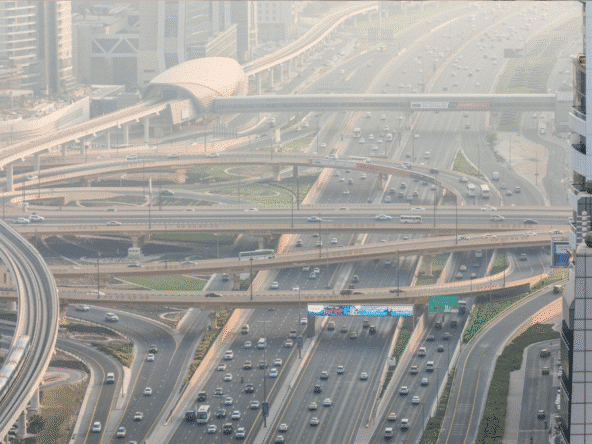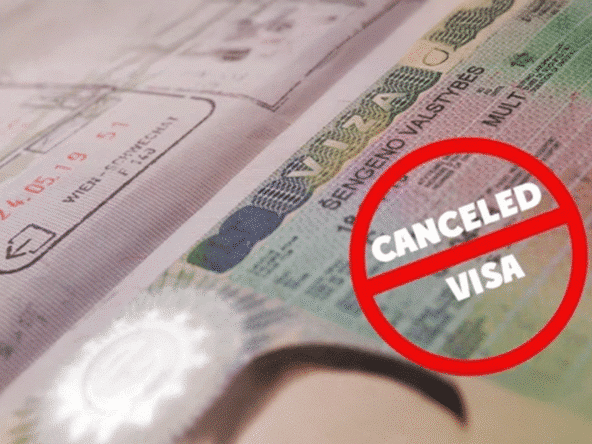Dubai and Sharjah are two of the UAE’s most vibrant and densely populated emirates, with thousands of residents commuting between them daily. While the connectivity between these two economic and residential hubs is essential, it has also become a source of growing concern due to increasingly congested roads. As a response, authorities have proposed stricter car ownership rules as part of a broader initiative to manage traffic flow, reduce congestion, and promote sustainable mobility across the Emirates. In parallel, developments like DAMAC Canal Heights offer strategically located living spaces in Dubai that reduce the need for long daily commutes, supporting the vision for smarter, more efficient urban living.
The proposed changes have triggered discussions across the UAE, raising questions about the long-term impact on residents, the environment, and the future of transportation in the region. In this article, we explore the reasons behind this proposal, what the car ownership rules might involve, potential impacts on society, and how this move fits into Dubai’s long-term vision for urban development and smart mobility.
The Traffic Challenge Between Dubai and Sharjah
The Dubai-Sharjah Commute: A Growing Challenge
Dubai is renowned for its futuristic skyline and world-class infrastructure, while Sharjah stands as a cultural hub with a thriving residential population. Many residents of Sharjah commute daily to Dubai, drawn by affordable housing. However, this daily movement places considerable pressure on major roads like Sheikh Mohammed Bin Zayed Road and Emirates Road, particularly during peak hours.
Studies highlight the Dubai-Sharjah corridor as one of the most congested routes in the UAE. What should be a 30-minute drive often stretches into hours of bumper-to-bumper traffic.
For those looking to avoid the commute and enjoy the convenience of city living, explore DAMAC Luxury vills for sale in Dubai —where unparalleled comfort and access to top amenities provide the perfect solution to an easier, more luxurious lifestyle. traffic during the workweek.
This congestion results in:
- Increased air pollution
- Higher fuel consumption
- Lost productivity
- Driver stress and road rage
- Deterioration of road infrastructure
To address this pressing issue, authorities are considering car ownership rules as a strategic solution—not just a reactive measure. Similarly, developments like DAMAC Aykon Tower C reflect the city’s forward-thinking approach, offering luxury living spaces in areas well-connected to Dubai’s infrastructure, allowing residents to embrace convenience and sustainability.
What Are the Proposed Stricter Car Ownership Rules?
Stricter Car Ownership Rules: A Vision for the Future
While full details of the proposals are still being finalized, the primary aim behind stricter car ownership rules is to reduce the number of vehicles on the road—particularly for short-distance daily commutes that could be managed by public transport or shared mobility solutions.
Proposed strategies might include improved public transport infrastructure, incentives for shared rides, and restrictions on car ownership in certain areas.
At DAMAC Properties , we embrace the future of sustainable living, offering developments that seamlessly integrate with modern urban solutions. Whether you’re looking for luxury apartments, villas, or townhouses, our communities are designed for comfort, convenience, and easy access to public transport hubs, reducing reliance on cars.
1. Limiting the Number of Cars per Household
One option under consideration is placing restrictions on the number of vehicles that can be registered to a single household or individual, particularly in high-density residential areas.
2. Tiered Registration Fees
The introduction of progressive car registration fees based on the number of vehicles owned by a person or family. For example, owning a second or third vehicle may incur higher annual fees or taxes.
3. Increased Parking Restrictions
Limiting public parking availability or increasing parking permit costs for areas with high vehicle density, especially around commercial zones.
4. Income-Based or Residency-Based Ownership Limits
Some proposals suggest using salary levels or emirate of residence as a factor in determining eligibility for owning multiple vehicles. This might particularly affect residents living in Sharjah but working in Dubai.
5. Environmental Impact Penalties
Older vehicles or high-emission cars could face stricter registration policies, encouraging the shift to electric vehicles and hybrids.
These strategies are designed to discourage unnecessary vehicle ownership, pushing residents toward public transportation and other sustainable alternatives.
Why Now? The Push for Sustainability and Smart Mobility
Dubai has long positioned itself as a global leader in innovation and future-forward city planning. In line with the Dubai 2040 Urban Master Plan and the UAE Net Zero 2050 strategy, urban sustainability and smart mobility are top priorities.
Reducing private car ownership aligns with several goals:
- Cutting carbon emissions
- Reducing energy consumption
- Enhancing the quality of urban life
- Promoting health and wellbeing
- Creating space for green zones and pedestrian-friendly areas
Moreover, with Dubai hosting COP28 recently and continuing to attract international business and tourism, it’s crucial to present a model of a livable, clean, and efficient city.
By tightening car ownership rules, Dubai is not punishing motorists—it is incentivizing a cultural and behavioral shift toward more intelligent, eco-conscious travel habits.
Public Reaction and Social Impacts
The Debate on Car Ownership and Convenience
Proposals to restrict car ownership in the UAE have sparked significant reactions from residents, with many expressing concerns about potential inconveniences—especially for large families or those living in areas where public transport is limited.
For those seeking more space, comfort, and independence,DAMAC villas for sale in DAMAC Lagoons offer a perfect solution. With spacious homes, world-class amenities, and a location that balances tranquility with convenience, these villas provide the ideal setting for families looking to enjoy modern living without the pressure of urban congestion.
Common concerns include:
- Limited accessibility to work or schools without personal vehicles
- Increased reliance on costly ride-hailing services
- Perceived unfairness toward lower-income households
On the other hand, proponents of the policy argue that bold steps are necessary to address long-term urban issues. Many cities around the world—such as Singapore, London, and Tokyo—have successfully implemented vehicle ownership restrictions paired with robust public transit systems.
The key to success in the UAE will lie in striking a balance between restriction and providing viable alternatives.
Strengthening Public Transportation as a Solution
The implementation of car ownership rules must go hand-in-hand with the expansion and improvement of public transport options. Dubai’s Roads and Transport Authority (RTA) has already made substantial investments in:
- The Dubai Metro (with ongoing expansion projects)
- Inter-city bus services
- Marine transport
- Cycling tracks and e-scooter programs
- Smart ride-hailing platforms like Hala and Careem
Sharjah has also been expanding its public bus services and exploring integration with Dubai’s systems. A seamless and reliable transport experience will be key to ensuring that reduced private vehicle ownership doesn’t translate into daily hardship.
To support this transition, Dubai may also introduce incentive programs such as:
- Subsidized transport passes
- Employer-sponsored transit benefits
- Carpool lanes and digital ride-share platforms
- Incentives for using electric bikes or scooters
Economic and Environmental Benefits
The Long-Term Benefits of Stricter Car Ownership Rules
Stricter car ownership regulations could offer significant long-term benefits—not only for individuals but also for the broader economy and environment. Reduced traffic congestion, improved air quality, and greater reliance on public transport could transform urban living for the better.
For those looking to embrace a lifestyle of convenience and luxury, explore DAMAC ready to move villas for sale in Dubai —where you can enjoy modern living and access to top amenities without the stress of traffic, all within the city’s vibrant ecosystem.
Economic Upsides:
- Reduced traffic congestion leads to fewer lost work hours.
- Lower fuel demand could result in energy efficiency savings.
- Government expenditure on road maintenance could decrease.
- Growth in alternative industries like micromobility, public transport, and tech-based urban services.
Environmental Gains:
- Fewer cars mean lower CO₂ and NO₂ emissions.
- Cleaner air, especially during peak traffic hours.
- Greater green space as fewer parking areas are needed.
- Reduced urban heat island effect due to fewer vehicles on roads.
A Shift in Urban Culture
Perhaps the most profound impact of these proposed car ownership rules is cultural. For decades, car ownership in the UAE has been seen as a symbol of status, convenience, and freedom. Shifting this narrative toward shared, sustainable, and tech-enabled mobility is no small feat.
But with smart planning, strong public support, and consistent infrastructure development, the future of transportation in Dubai and Sharjah may look drastically different—and better.
By 2030, we may see fewer private vehicles on the roads, replaced by autonomous shuttles, high-speed trains, and clean-energy scooters. The cities could become quieter, cleaner, and more enjoyable for pedestrians and families alike. Similarly, projects like DAMAC ELO 2 represent the move toward sustainable living, offering modern homes that align with the vision of a greener, more connected future.
Related Topics
AUTHENTIC KOREAN FOOD
SAME DAY DELIVERY CLOTHES DUBAI
Luxury Living Amid New Car Ownership Rules: Invest in Dubai Real Estate with DAMAC
In the midst of discussions surrounding new Car ownership rules and evolving urban policies aimed at easing congestion between Dubai and Sharjah, there’s an even smarter move for long-term comfort and luxury—investing in real estate with DAMAC. If you’re looking for premium properties for sale in Dubai, DAMAC stands out as one of the most prestigious names in the industry. Offering an exceptional portfolio of luxury homes, DAMAC presents stunning high-rise apartments with panoramic city views, waterfront residences in exclusive gated communities, and expansive villas in tranquil clusters designed for elite living. Whether it’s a sleek, modern townhouse close to top-tier amenities or an elegant apartment with resort-style features, every property reflects the highest standards of design and sophistication. As Dubai’s infrastructure grows and Car ownership rules shift, securing a residence in a well-connected, luxurious location is more valuable than ever. Choose DAMAC and elevate your lifestyle while making a future-proof investment.
Disclaimer: The information presented in this article is for general informational purposes only. The details provided are based on the best information available at the time of publication and may be subject to change without notice due to potential updates in educational policies or scheduling adjustments by the respective authorities. Readers are advised to contact the relevant offices directly for the most accurate and current information.




